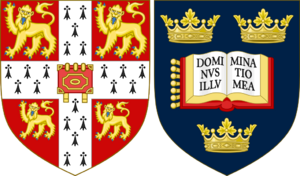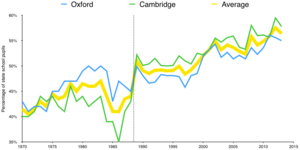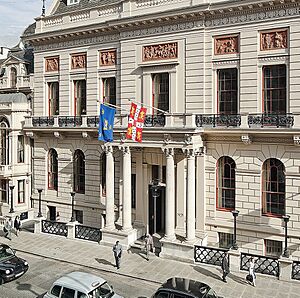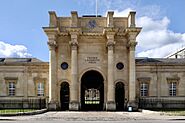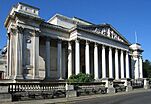Oxbridge facts for kids
Oxbridge is a special name that combines the names of two very famous universities in the United Kingdom: the University of Oxford and the University of Cambridge. These are the two oldest, richest, and most respected universities in the UK. People use "Oxbridge" to talk about them together, especially when comparing them to other universities. Sometimes, the word also suggests a high level of social or academic standing.
Contents
How the Name "Oxbridge" Started
Even though both universities are more than 800 years old, the name "Oxbridge" is quite new. The writer William Makepeace Thackeray used a similar idea in his book Pendennis, published in 1850. In the story, a character goes to a made-up college called "Boniface College, Oxbridge." The Oxford English Dictionary says that the first time "Oxbridge" was officially written down was by Virginia Woolf. She used it in her essay "A Room of One's Own" in 1929, mentioning Thackeray's book. Later, the term appeared in the Times Educational Supplement in 1957 and in Universities Quarterly in 1958. When people say the full names, they almost always say "Oxford and Cambridge." This is because Oxford was founded first.
What Makes Oxbridge Special?
Besides being a combined name, "Oxbridge" also describes things these two universities have in common:
Oldest Universities in the UK
- Oxford and Cambridge are the two oldest universities that have been open non-stop in the UK.
- Both were started over 800 years ago. They were the only universities in England until the 1800s.
- For a long time, they worked to keep other universities from opening.
- Many important scientists, writers, and politicians from Britain studied at Oxford or Cambridge.
Unique College System
- Both universities have a similar college system. This means the university is made up of many smaller colleges working together.
- These colleges are in charge of special teaching sessions called supervisions or tutorials. These are small group or one-on-one lessons, which are a unique way of teaching at Oxbridge.
- Colleges also provide places for students to live and offer support.
- They both have famous publishing companies: Oxford University Press and Cambridge University Press.
- They have beautiful botanical gardens, like the University of Oxford Botanic Garden and the Cambridge University Botanic Garden.
- Both have important museums: the Ashmolean in Oxford and the Fitzwilliam in Cambridge.
- They have huge libraries, such as the Bodleian and the Cambridge University Library.
- Both have well-known debating societies: the Oxford Union and the Cambridge Union.
- They also have famous comedy groups, like The Oxford Revue and The Cambridge Footlights.
Friendly Rivalry
- There has been a rivalry between Oxford and Cambridge for a long time. It started around 1209 when Cambridge was founded by scholars who left Oxford because of problems with local people.
- This rivalry is still celebrated today in sports events, like The Boat Race, where their rowing teams compete.
Competitive Admissions
- Oxford and Cambridge are usually at the top of UK university rankings. This means many ambitious students want to go there.
- Getting in is very competitive. Some schools even promote themselves based on how many of their students get into Oxbridge.
- Together, these two universities award a large number of all research doctorates in England.
- They have similar ways of accepting students. Applications must be sent in earlier than for other UK universities.
- Students usually cannot apply to both Oxford and Cambridge in the same year.
- Most students who apply have excellent grades. Interviews are used to see if the course is a good fit for the student and to check for self-motivation and thinking skills.
- The Oxford and Cambridge Club is a private club mostly for people who have studied at these two universities.
Other Related University Names
Other combined names have been made using "Oxbridge," but they are not as well known:
Loxbridge
- The term Loxbridge refers to the "golden triangle" of London, Oxford, and Cambridge universities. These are often seen as the most research-intensive universities in the UK.
Doxbridge
- Doxbridge refers to Durham, Oxford, and Cambridge. This name was also used for a yearly sports competition between some colleges from Durham, Oxford, Cambridge, and York.
Woxbridge
- Woxbridge is the name of a yearly meeting between the business schools of Warwick, Oxford, and Cambridge.
Stoxbridge
- When the University of St Andrews was ranked very high in 2023, the top three universities were sometimes called Stoxbridge. This name included St Andrews, Oxford, and Cambridge.
Camford
- Thackeray's book Pendennis, which helped popularize "Oxbridge," also used Camford as another combination of the university names.
- However, Camford has never become as popular as Oxbridge.
- Camford is used as the name of a made-up university city in the Sherlock Holmes story The Adventure of the Creeping Man (1923).
See also
 In Spanish: Oxbridge para niños
In Spanish: Oxbridge para niños
- Armorial of British universities
- Golden triangle, sometimes called Loxbridge: a group of top universities in Oxford, Cambridge, and London
- Ivy League, a group of eight famous universities in the United States
- Oxford–Cambridge rivalry
- Russell Group
 | Bayard Rustin |
 | Jeannette Carter |
 | Jeremiah A. Brown |


